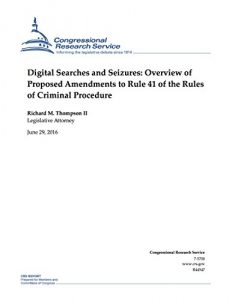With the Rules Enabling Act, Congress granted to the Supreme Court the authority to write federal rules of procedure, including the rules of criminal procedure. After several years of evaluation by the Judicial Conference, the policy-making arm of the federal judiciary, on April 28, 2016, the Supreme Court transmitted to Congress proposed changes to Rule 41 of the Federal Rules of Criminal Procedure. These proposed changes would amend the federal search and seizure rules to permit the government to remotely access electronic devices although the location of the device may be unknown. This issue has become more pressing in recent years with an increasing number of users anonymizing their communications, hindering the government’s ability to pinpoint the location of the target, and thus making it difficult to discern the appropriate federal court to apply for a search warrant.
In recent years, a tension has arisen between Rule 41 as currently drafted and the Department of Justice’s (DOJ’s) desired use of the rule for digital searches. This issue arose recently in a 2012 magistrate judge’s ruling from the Southern District of Texas, in which the court denied DOJ’s application to conduct remote searches of a computer believed to have been part of a fraudulent scheme, because the government could not establish the location of the target, thereby placing it outside the scope of Rule 41 and in violation of the Fourth Amendment particularity requirement.
There have been at least two lines of argument against the proposed rule change, one based on the substance of the proposed amendment and the other grounded in the process by which the rule is being changed. The substantive arguments pertain to the actual substance of the rule and include for example, an argument that the new rule would breach the particularity requirement of the Fourth Amendment. The procedural arguments pertain to how this potential authorization should be made law: through the rulemaking process by the courts or through enacted legislation by Congress. While federal law enforcement has been supportive of the proposed change, some advocacy groups have argued that the proposed rule change “would have significant legal and technical implications” and thus “merit[s] open consideration by Congress, rather than a rulemaking proceeding of the Judicial Conference.”
This report provides a brief overview of the proposed amendment to Rule 41. First, it provides a background on the origin of, and rationale underlying, the proposed amendment and a description of the rule as currently written. Second, it reviews the potential changes made by the proposed amendment and will survey various concerns commenters have raised with the proposal. Lastly, this report addresses efforts being made in Congress to alter, delay, or stop this rule change.
In recent years, a tension has arisen between Rule 41 as currently drafted and the Department of Justice’s (DOJ’s) desired use of the rule for digital searches. This issue arose recently in a 2012 magistrate judge’s ruling from the Southern District of Texas, in which the court denied DOJ’s application to conduct remote searches of a computer believed to have been part of a fraudulent scheme, because the government could not establish the location of the target, thereby placing it outside the scope of Rule 41 and in violation of the Fourth Amendment particularity requirement.
There have been at least two lines of argument against the proposed rule change, one based on the substance of the proposed amendment and the other grounded in the process by which the rule is being changed. The substantive arguments pertain to the actual substance of the rule and include for example, an argument that the new rule would breach the particularity requirement of the Fourth Amendment. The procedural arguments pertain to how this potential authorization should be made law: through the rulemaking process by the courts or through enacted legislation by Congress. While federal law enforcement has been supportive of the proposed change, some advocacy groups have argued that the proposed rule change “would have significant legal and technical implications” and thus “merit[s] open consideration by Congress, rather than a rulemaking proceeding of the Judicial Conference.”
This report provides a brief overview of the proposed amendment to Rule 41. First, it provides a background on the origin of, and rationale underlying, the proposed amendment and a description of the rule as currently written. Second, it reviews the potential changes made by the proposed amendment and will survey various concerns commenters have raised with the proposal. Lastly, this report addresses efforts being made in Congress to alter, delay, or stop this rule change.












